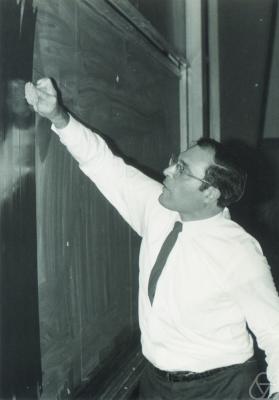Gian-Carlo Rota
| Gian-Carlo Rota | |
|---|---|

Rota in 1970.
|
|
| Born |
April 27, 1932 Vigevano, Italy |
| Died | April 18, 1999 (aged 66) Cambridge, Massachusetts, USA |
| Residence | Italy, Ecuador, USA |
| Fields | Mathematics, Philosophy |
| Institutions |
Massachusetts Institute of Technology Los Alamos National Laboratory The Rockefeller University |
| Alma mater |
Princeton University Yale University |
| Doctoral advisor | Jacob T. Schwartz |
| Notable students | |
| Notable awards | Leroy P. Steele Prize (1988) |
Gian-Carlo Rota (April 27, 1932 – April 18, 1999) was an Italian-born American mathematician and philosopher.
Rota was born in Vigevano, Italy. His father, Giovanni, a prominent antifascist, was the brother of the mathematician Rosetta, who was the wife of the writer Ennio Flaiano. Gian-Carlo's family left Italy when he was 13 years old, initially going to Switzerland.
Rota attended the Colegio Americano de Quito in Ecuador, and earned degrees at Princeton University and Yale University.
Much of Rota's career was spent as a professor at the Massachusetts Institute of Technology (MIT), where he was and remains the only person ever to be appointed Professor of Applied Mathematics and Philosophy. Rota was also the Norbert Wiener Professor of Applied Mathematics.
In addition to his professorships at MIT, Rota held four honorary degrees, from the University of Strasbourg, France (1984); the University of L'Aquila, Italy (1990); the University of Bologna, Italy (1996); and Brooklyn Polytechnic University (1997). From 1966 until his untimely death in 1999, Rota was a consultant at Los Alamos National Laboratory, frequently visiting to lecture, discuss, and collaborate, notably with his friend Stanislaw Ulam. He was also a consultant for the Rand Corporation (1966–71) and for the Brookhaven National Laboratory (1969–1973). Rota was elected to the National Academy of Sciences in 1982, was vice president of the American Mathematical Society (AMS) from 1995–97, and was a member of numerous other mathematical and philosophical organizations.
...
Wikipedia
